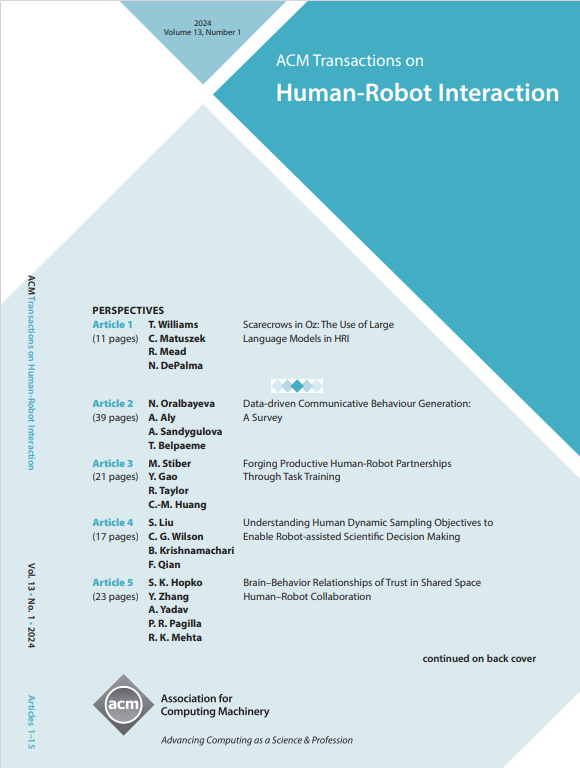Affective Robots Need Therapy
IF 5.5
Q2 ROBOTICS
引用次数: 0
Abstract
Emotion researchers have begun to converge on the theory that emotions are psychologically and socially constructed. A common assumption in affective robotics is that emotions are categorical brain-body states that can be confidently modeled. But if emotions are constructed, then they are interpretive, ambiguous, and specific to an individual’s unique experience. Constructivist views of emotion pose several challenges to affective robotics: first, it calls into question the validity of attempting to obtain objective measures of emotion through rating scales or biometrics. Second, ambiguous subjective data poses a challenge to computational systems that need structured and definite data to operate. How can a constructivist view of emotion be rectified with these challenges? In this article, we look to psychotherapy for ontological, epistemic, and methodological guidance. These fields (1) already understand emotions to be intrinsically embodied, relative, and metaphorical and (2) have built up substantial knowledge informed by everyday practice. It is our hope that by using interpretive methods inspired by therapeutic approaches, HRI researchers will be able to focus on the practicalities of designing effective embodied emotional interactions.情感机器人需要治疗
情绪研究人员已经开始集中于情绪是心理和社会建构的理论。情感机器人的一个普遍假设是,情绪是可以自信地建模的大脑-身体状态的分类。但如果情感是被构建的,那么它们就是可解释的、模棱两可的,并且是特定于个人独特经历的。情感的建构主义观点对情感机器人提出了几个挑战:首先,它对试图通过评分量表或生物识别技术获得客观情感测量的有效性提出了质疑。其次,模糊的主观数据对需要结构化和明确数据来操作的计算系统提出了挑战。如何通过这些挑战来修正建构主义的情绪观呢?在这篇文章中,我们期待心理治疗的本体论,认识论和方法论的指导。这些领域(1)已经理解了情感本质上是具体化的、相对的和隐喻的;(2)通过日常实践积累了大量的知识。我们希望通过使用受治疗方法启发的解释方法,HRI研究人员将能够专注于设计有效的具体化情感互动的实用性。
本文章由计算机程序翻译,如有差异,请以英文原文为准。
求助全文
约1分钟内获得全文
求助全文
来源期刊

ACM Transactions on Human-Robot Interaction
Computer Science-Artificial Intelligence
CiteScore
7.70
自引率
5.90%
发文量
65
期刊介绍:
ACM Transactions on Human-Robot Interaction (THRI) is a prestigious Gold Open Access journal that aspires to lead the field of human-robot interaction as a top-tier, peer-reviewed, interdisciplinary publication. The journal prioritizes articles that significantly contribute to the current state of the art, enhance overall knowledge, have a broad appeal, and are accessible to a diverse audience. Submissions are expected to meet a high scholarly standard, and authors are encouraged to ensure their research is well-presented, advancing the understanding of human-robot interaction, adding cutting-edge or general insights to the field, or challenging current perspectives in this research domain.
THRI warmly invites well-crafted paper submissions from a variety of disciplines, encompassing robotics, computer science, engineering, design, and the behavioral and social sciences. The scholarly articles published in THRI may cover a range of topics such as the nature of human interactions with robots and robotic technologies, methods to enhance or enable novel forms of interaction, and the societal or organizational impacts of these interactions. The editorial team is also keen on receiving proposals for special issues that focus on specific technical challenges or that apply human-robot interaction research to further areas like social computing, consumer behavior, health, and education.
 求助内容:
求助内容: 应助结果提醒方式:
应助结果提醒方式:


